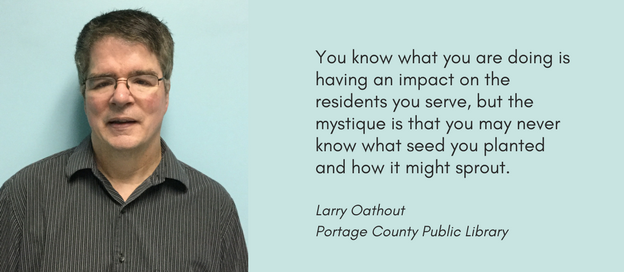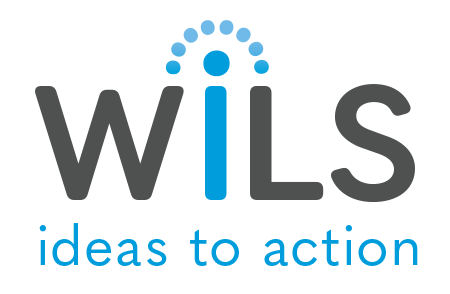
One of our greatest joys at WiLS is hearing our members tell the stories of the big and important work they are doing – interesting new projects or initiatives, or even interesting and new approaches to old projects. And, in addition to hearing about it, it makes us even happier when we can share those stories with other members. Each month, WiLS is proud to feature an interview with one of our library members. This month, we interview Larry Oathout, Director of the Portage County Public Library.
Why did you, personally, choose to work in libraries?
Guilt may have a lot to do with it. My childhood librarian toiled for years to get me to learn my library card number and I failed her every single time. Her shoulders would sag, but she would always try again on my next visit. I’m indebted to her, although she would probably be shocked by my career path. As an undergrad student, I found myself spending more and more time at the University library. Not only was I using it to complete assignments, but I found myself making up excuses to go and spend hours in the periodicals section reading newspapers from all over the country and walking through the stacks looking at all the interesting topics. It took me another 15 years before I realized (or admitted) I really wanted to work in a library.
I think it is the opportunity to help people and to do something new every day that is so attractive about this profession. You know what you are doing is having an impact on the residents you serve, but the mystique is that you may never know what seed you planted and how it might sprout.
What is unique about the culture of your library? How do you influence it?
I feel we have a good mix of experience and newness on our staff. The newer employees we are bringing in have a passion for libraries and are getting support from the veterans. That results in people who are providing good dialogue at meetings and producing ideas that can make us better. Our recent staff in-service generated over 300 ideas. Now we need to sift through those and find things that can transform the library and our service.
I want to be a guiding force in the process, but it is also my job to give staff the space they need to grow and get better. With good support, people should be able to work effectively and independently.
What do you think is important to know about the community you work with? What helps you understand their needs?
Libraries need to understand that every community is different and therefore every library should be different to serve those individuals. Portage County has urban branches that serve tens of thousands of residents, but also rural branches that are important to their communities of 500 residents. What works in one location will not necessarily be needed in another. In other words, libraries shouldn’t be carbon copies of each other. It’s important to listen to community members about their wants, get involved on a personal level, and use other methods, like analytics, to get to know people better.
What big ideas are being worked on at your library? What problems are being solved?
There have been so many things to do, besides learning a new state, community, and staff. Our library has not had a new strategic plan since 2008, so we are trying to fix that in the next year. We are doing a review of policies to weed out processes that could be a barrier to the best public service we can offer, and we also have an upcoming capital improvement plan to install RFID and new self-check machines in the next two years.
Do you have anything else you’d like to share here?
While I’ve only been in my position for a year, I have been encouraged by the level of sharing through WLA, WiLS, regional systems and other meetings. It’s nice to know we aren’t alone in trying to solve problems, but can openly share expertise for the benefit of all.
——————
These interviews are part of a series of interviews with both WiLS library and vendor partners. Your feedback is appreciated. If you have any to offer on this article, or suggestions for upcoming interviews, contact Andrea Coffin at acoffin@wils.org.
